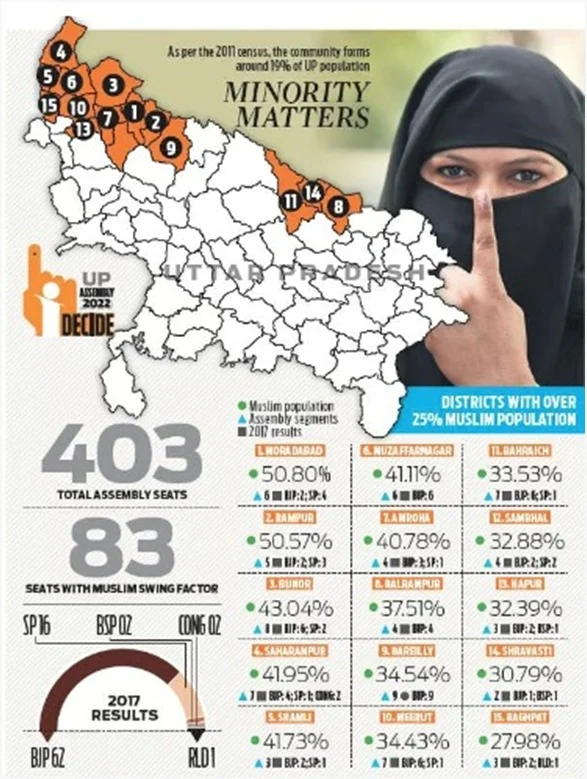The period of irrelevance of Muslim votes in Uttar Pradesh expired after a decade. The fear among secular parties in fielding Muslim candidates, lest the Hindu votes may shrink, also faded in 2024.
The outcome of recently held Parliamentary Elections has opened new avenues and new challenges as well, before the Muslim community, not confined to UP alone. On one hand, the number of Muslim MPs from UP has increased; on the other hand, a backlash from the communal forces is gradually pushing them to the receiving end again. Bulldozers are rolling aggressively in different areas under different pretexts, razing hundreds of houses to the ground and shattering thousands of families.
The irony of the time is that the forces that gained political strength with Muslim votes are tight-lipped at the new wave of oppression rather the victims of vindictiveness.
Muslims have, over the last few years and until this election, been caught in a dilemma as they have not been able to consider any one party in the state as their benefactor.
Till about a decade ago, the voting behaviour of Muslims in Uttar Pradesh used to be a decisive factor in about two dozen Lok Sabha seats. The main political parties in those elections, such as the Samajwadi Party, the Bahujan Samaj Party and the Congress, whether in alliance or separately, used to bank heavily on the support of Muslims.
This used to be the norm from the 1970s till the general election of 2014, when the Narendra Modi wave made all such factors redundant. Riding high on it, the Bharatiya Janata Party got the majority community to vote in such numbers so as to make the Muslim “vote bank” irrelevant.
However, ten years of BJP rule at the Centre has taken away much of the wind from beneath that wave. In the recent elections the significance of the electoral heft of Muslim voters has once again come into play.
In a correction course of its policy towards Muslims, Akhilesh skipped the consecration of the Ram Mandir in Ayodhya, visited the family residence of late Mukhtar Ansari in Ghazipur to pay condolences (although late) and risked disaffection in the party by ignoring upper caste Hindus for key bye-elections.
The Muslim vote in UP
According to several estimates, Muslims account for 19% to 23% of the state’s population.
The Muslim-dominated Lok Sabha seats include Saharanpur (29.6% Muslim voters), Muzaffaranagar (27%), Bijnor (28%), Nagina (28%), Moradabad (28%), Rampur (42%), Sambhal (22%), Amroha (32%), Meerut (23%), Sitapur (24%), Kairana (23%), Bareilly (23%), Pilibhit (19%), Shahjahanpur (21%), Bahraich (23%), Shravasti (28%), Domariyaganj (26%) and Lucknow (23%).
The list also includes Kanpur (19%), Bulandshahar (19%), Baghpat (18.8%), Ghaziabad (16%), Aligarh (19%) and Azamgarh (16%).
The Muslim pattern of voting has often been referred to as “tactical voting,” where the sole aim is to ensure the defeat of a candidate whose party is considered to be apathetic to Muslim interests.
Advantage INDIA bloc
In this case, voting to ensure the BJP’s candidates’ defeat could have led Muslim voters to support either the SP-Congress INDIA bloc, or the BSP. It appears that the community could have preferred the former in most places, while the BSP could be preferred only in places where the INDIA combine is thought to be weaker.
In many districts, there have been reports of voters, including women, having voted in favour of the SP-Congress combine. But the Muslim voter is totally silent with no proclamations from community leaders whatsoever.
Shelving the attitude of making Muslim votes irrelevant, this time the BJP went into the 2024 election in alliance with the Rashtriya Lok Dal which has been favoured by Muslim voters in its stronghold areas. Even during the campaign, the BJP leaders accompanied RLD leaders in Muslim-dominated areas.
The party tried to reach out with ‘Pasmanda Muslims’, a term that was coined to include backwards, Dalits and tribal Muslims. But it could hardly woo the Muslims. And the INDIA bloc registered a record victory of 43 seats pushing the BJP to only 33 seats.
Five Muslims – four from SP and one on INC ticket – won the election to enter into the lower house of parliament. At the same time a sitting MP from Amroha, Kanwar Danish Ali lost to the BJP candidate and the main reason for his defeat was BSP Muslim candidate Mujahid Ali.


